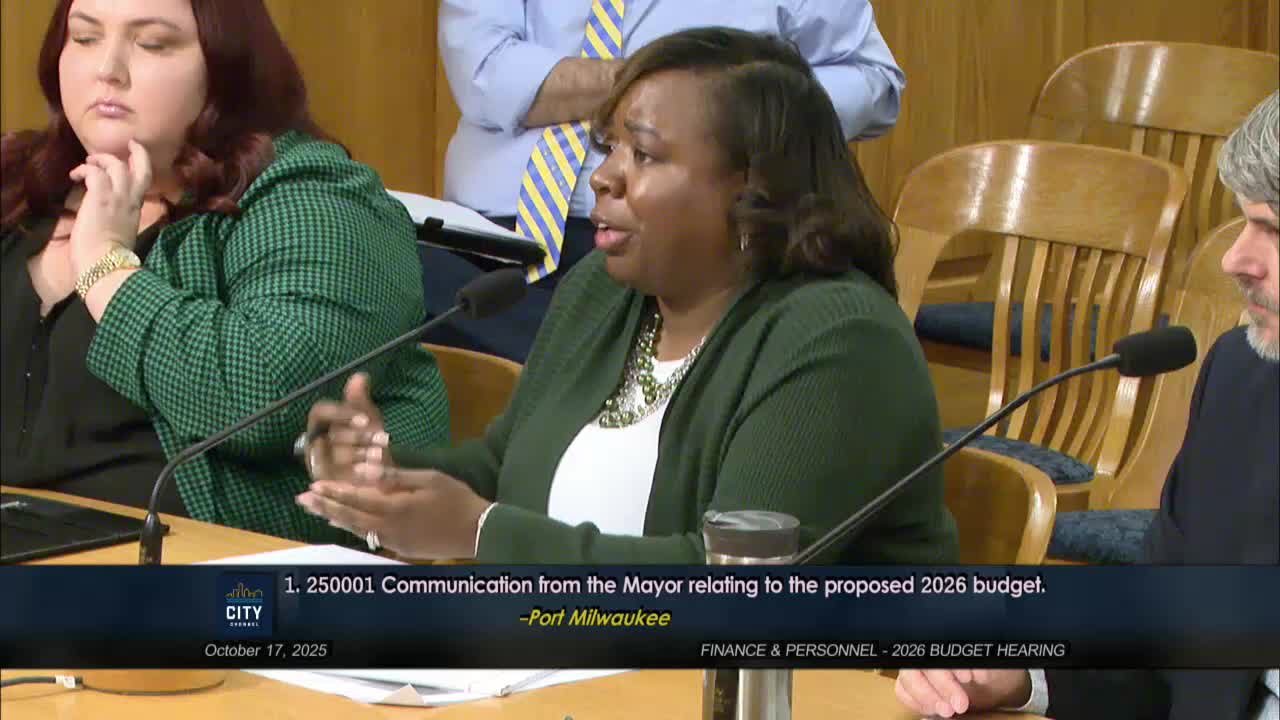Milwaukee Election Commission seeks extra staffing and machine funds as city prepares for four elections in 2026
Get AI-powered insights, summaries, and transcripts
Subscribe
Summary
The Election Commission told the Finance & Personnel Committee its 2026 proposed budget rises mainly because 2026 has four elections (versus two in 2025). The department is adding temporary staff funds and money for voting‑system upgrades after the April ballot shortage and high turnout in November.
The Milwaukee Election Commission presented a 2026 budget request to the Common Council’s Finance and Personnel Committee on Oct. 17 seeking funds to staff four elections in 2026 and to replace or upgrade voting equipment after a ballot shortage in April.
Lede: The commission’s proposed 2026 budget increases by roughly $2 million from 2025, driven largely by higher temporary staffing and operating costs tied to holding four elections next year rather than the two that occurred in 2025.
Nut Graf: Tyler Calaguero of the Budget Management Division told the committee that the bulk of the rise is in temporary salaries (from about $1.2 million to $2.5 million) and operating expenses needed for ballot production and voting‑system upkeep. Commission leaders said the April ballot shortage and the district’s high turnout in November prompted changes in ordering and operational practices.
Key points from the commission: The Election Commission’s executive director, Paulina Gutierrez, and deputy director Marisha Harris explained that 2026 includes four scheduled elections — increasing the commission’s need for temporary workers, ballots, postage and equipment maintenance. The commission’s operating request includes funds for express‑vote kiosk printers and for upgrades and maintenance of voting equipment; staff cited a proposal showing roughly $170,000 for additional express‑voting machines and $730,000 for upgrades.
Ballot‑shortage changes: Commission staff said the April 2025 ‘‘ballot shortage’’ prompted changes to ballot ordering and pre‑election planning. Staff described a move toward a ‘‘one‑to‑one’’ preprinted ballot ordering practice for many elections and said for the general election they plan to order double to avoid April‑style shortages. The commission also said it will increase supplies and training, and expand early‑voting capacity.
Express vote machines and training: Commission leaders described steps to make express‑vote machines (accessible voting kiosks that produce a paper ballot) more available and better understood. Historically the machines were treated primarily as ADA assistance devices and one was assigned per polling location; the commission told the committee it plans to increase the number at some locations and expand training and public outreach so more voters and poll workers use them. Staff and aldermen discussed whether that would reduce election‑day waits and number of paper ballots needed.
Early voting and systems performance: The commission reported expanded early‑voting demand and discussed a notable service slowdown at Tippecanoe in 2024 when the state system used for election processing slowed under large demand, producing long wait times. The commission said it is coordinating with the Wisconsin Elections Commission and national partners on system capacity and contingency plans; it also described ongoing efforts to add ‘‘boutique’’ and mobile early‑voting locations and better public messaging.
Absentee and ballot security: Commission leaders said they continue to prioritize security, transparency and legal compliance; they described new measures to track absentee ballots and improved public communications following April’s ballot‑ordering problems. Paulina Gutierrez said the commission has instituted after‑action reviews and is working with national partners to refine processes.
Facilities and staffing: The commission is pursuing a temporary Midtown site for in‑person absentee voting and is searching for a permanent Midtown location; staff said they will bring any leases to council for approval. The commission also described planned investments in poll‑worker training, new staffing‑management processes, and recruiting among students and higher‑education partners.
What the committee asked: Council members pressed the commission on whether the express‑vote kiosks could replace paper ballot stock, how the commission will avoid repeat ballot shortages, and whether the Midtown temporary site will be in place well before early voting begins. Commissioners said the express vote produces an actual ballot that can be tabulated, that they have adopted one‑to‑one preprinted ballot ordering and double‑ordering for major elections, and that they’ve arranged a short‑term lease while pursuing a permanent site.
Ending: The Election Commission’s 2026 budget presentation centered on operational lessons from 2024–25, equipment upgrades and staffing needs for a four‑election year. Council members requested follow‑up details on machine purchases, ballot ordering policies, and progress on Midtown voting sites.
Selected quotes: "There are four elections in 2026 compared to two in 2025," Budget Analyst Tyler Calaguero told the committee. Executive Director Paulina Gutierrez said, "We are planning the 2026 governor's race as if it were presidential," reflecting expectations of high turnout.
Votes at a glance: No formal committee votes were taken on the Election Commission’s budget during this Oct. 17 hearing.
